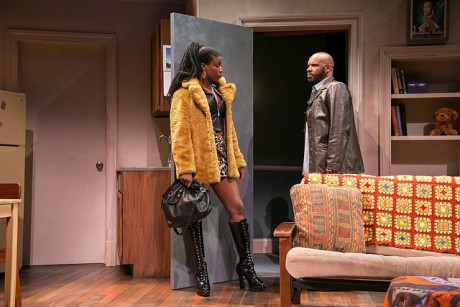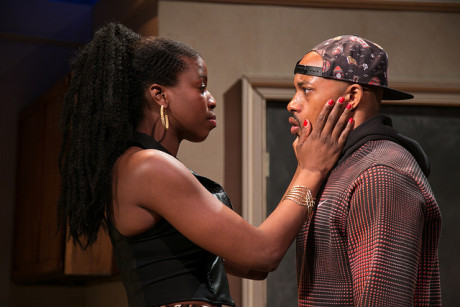Dominique Morisseau’s Sunset Baby is social realism with snap. It knows how to “unlock all that attitude,” as one of the play’s three characters puts it, and audiences attending the regional premiere at Rep Stage had best be prepared for it.

First and foremost, there’s Nina, a bristling, red-hot bundle of African-American attitude who won’t even soft-soap what she does to survive: sell drugs and rob her own people. She’s stuck in a Brooklyn tenement with a few sticks of furniture and the vague notion that moving somewhere else —maybe London — will give her the security at last to build a home and family.
Don’t tell that to boyfriend Damon, however, because he doesn’t fit in with Nina’s dreams. She wants just one thing from him now, and it isn’t a family. She is not impressed with the fatherhood skills he shows his own seven-year-old son by a former girlfriend, let alone his prospects for adapting to any lifestyle that doesn’t depend on street hustling and armed coercion.
Finally, there’s Kenyatta, who is Nina’s biological father. He was a “black power” radical back in the day when violence was still being done in the name of community. He missed most of Nina’s childhood and all of her adulthood, though, when he was locked away for his part in an armed robbery that went bad.
Now Kenyatta is back, and for undefined reasons he sorely wants a bundle of letters written to him by Nina’s mother, Ashanti, while he was in prison. Perhaps he wants to recapture some of the idealism and hope that were lost forever when Ashanti died of a drug overdose.
On the surface, you could hardly find a less sentimental play than Sunset Baby, with its criminal swagger and hip-hop bravado. But under that hardened surface is not teargas but tears of self-pity. It’s about only one sort of love, and that is romantic love, and the seeming impossibility of ever truly owning it.
All three Equity actors at Rep Stage are terrific. They are believable and natural through all the stereotypical explosions of anger and hurt, yet capable of making their characters pop with small, unexpected flashes of insight.
Valeka J. Holt walks the trickiest line when it comes to winning our sympathy as Nina. But she will reduce you to a puddle in one scene when she comes upon a photo of herself as a toddler with her father, and suddenly all the pain of her childhood is reeled back and her face blossoms with a shy, girlish delight.
Just as distinct in his way is Manu Kumasi as Damon, the fast-talking wheeler-dealer who leaves no doubt about his capacity for frustration and violence. Kumasi is especially convincing when it comes to Damon’s native intelligence — as when one of his glib rap riffs suddenly gives way to a stunningly unexpected word choice, like “bleak.”
The most demanding role, though, may be the one played by Jefferson A. Russell. As Kenyatta, Russell seems almost like a character in a different play, acting out a whole back story and showing us the broken result of hijacked dreams. He is also required to deliver some of the play’s least persuasive writing as he transfers Kenyatta’s sketchy poetic impulses to a camcorder.
Looking a lot like playwright August Wilson in his sporty cap and faux-leather jacket, Russell turns Kenyatta into some sort of wounded lion, even if not precisely a literary lion. It’s a performance that resonates with dignity and guarded honor. It should be remembered at Helen Hayes Awards time.
Director Joseph W. Ritsch guides the play skillfully through its staccato blackouts and sound cues, never allowing the pace or interest to wander.

Everyone is benefitted at Rep Stage by the strong physical production. It starts with an intriguing view by Scenic Designer Daniel Ettinger of that shabby tenement cutaway situated before a skewed urban landscape. Lighting Design by Dan Covey is spot-on, complimented by the smart background music by Sound Designer Bryan Schlein.
Running Time: About one hour and 40 minutes, with no intermission.
Sunset Baby by Rep Stage plays through May 17, 2015 in the Smith Theatre of the Horowitz Visual and Performing Arts Center at Howard Community College — 10901 Little Patuxent Parkway, in Columbia, MD. For tickets call the box office at (443) 518-1500, or purchase them online.
https://youtu.be/78OMJKk3hQM




